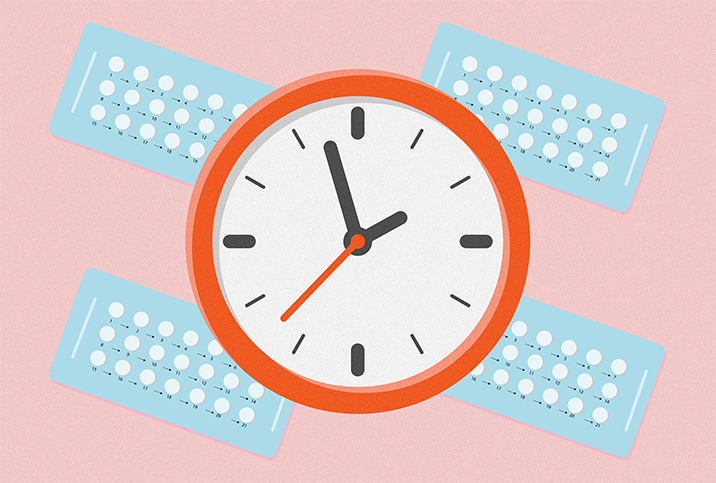Should You Worry About Post-Pill Amenorrhea?

In addition to preventing unplanned pregnancies, hormonal contraceptives can provide a variety of benefits, including supporting a regular period. However, when a person stops hormonal birth control, the body may need some time to readjust.
During this time, "post-pill amenorrhea," or lack of a period, can occur. While an adjustment period is often normal, amenorrhea can also indicate an underlying and potentially serious issue.
The pill and your cycle
"Combined oral contraceptives work, in part, by stopping ovulation," explained Sara Twogood, M.D., a board-certified OB-GYN in Los Angeles and co-founder of Female Health Education workshops and the online magazine Female Health Collective.
"They maintain a steady dose of estrogen and progesterone each day, effectively stopping the body from sending the usual signals between the brain and ovaries that tell them to mature an egg, ovulate and/or get ready for a potential pregnancy," Twogood said.
These hormones cause your uterus lining to thicken in preparation for pregnancy, and if no pregnancy occurs, the lining is shed during your period. That's why, even though ovulation doesn't occur when you're on birth control, you might still experience a "period" during your placebo week.
This isn't a true period because no ovulation occurred, but instead is referred to as "withdrawal bleeding," explained Jennefer Russo, M.D., M.P.H., a Los Angeles-based OB-GYN and vice chair of clinical affairs for the obstetrics and gynecology department at Harbor-UCLA Medical Center. Over time, combined hormonal contraceptives can gradually decrease the uterine lining thickness, causing bleeding to become lighter.
Withdrawal bleeding shouldn't be confused with breakthrough bleeding, which occurs outside the usual placebo week.
"If someone prefers not to get a period, they can take pills continuously [without the placebo week]," Russo said. "They may have breakthrough bleeding for three to six months, which should decrease over time."
Women may also experience breakthrough bleeding when they first begin taking hormonal birth control. This is a common symptom even if the pills aren't being taken continuously, Russo said.
"Otherwise, breakthrough bleeding isn't typical with the pill," Russo continued. "If someone is experiencing it, they should see their doctor. It can be a sign of pregnancy, infection, a uterine or cervical abnormality, or it can just be that they may need to try a different pill with a different hormonal formulation."
Hormonal contraceptives produce an artificial period and generally stable menstrual cycle, so they can temporarily rectify issues such as irregular or heavy periods and PMS.
What causes post-pill amenorrhea?
Hormonal contraceptives stop the ovaries from producing ovulation-inducing hormones, so it can take a while for the body to adjust and resume producing these hormones on its own. For most people who take combined hormonal contraception with estrogen and progestin, the menstrual cycle returns to "normal" within three months.
"After a woman stops the pill, it can take anywhere from one month to several months to resume a 'normal' cycle, but a woman should see her physician if her menstrual cycle does not resume after the third month after she has stopped the pill," advised Brynna Connor, M.D., Austin, Texas-based physician and healthcare ambassador at NorthWestPharmacy.com.
Russo advised an earlier time frame, recommending a woman see her physician if her period hasn't returned within four to six weeks after stopping the pill—or sooner if she thinks she could be pregnant.
"How long this takes is different for everyone; some bodies adjust very quickly and others take a bit longer," Connor said. "This process is very individualized."
The body eliminates all traces of most hormonal contraceptives within 48 hours after their use is stopped, so the length of time someone is on birth control has no impact. However, if a person experienced menstrual irregularities, including amenorrhea, before starting hormonal contraceptives, it's likely those issues will resurface.
If a person experienced menstrual irregularities, including amenorrhea, before starting hormonal contraceptives, it's likely those issues will resurface.
"Post-pill amenorrhea can occur for a few reasons," Twogood said. "Sometimes it takes a few months for the brain and ovaries to get back in sync with one another and to start 'communicating' with one another, which is why it can take a few months for a cycle to return after stopping the pill."
"Another reason is that someone could have an underlying reason they would not get their periods, such as PCOS [polycystic ovary syndrome] or a thyroid disorder," Twogood continued. "The pill can treat problems that arise from not menstruating by inducing a period, but it doesn't solve the underlying disorder. That means when someone comes off the pill, they won't have a period."
For people of reproductive age who are sexually active with a heterosexual partner, pregnancy might be the cause of post-pill amenorrhea, Connor said. Other potential reasons include extreme weight loss or malnutrition, hormone irregularities, stress, menopause or perimenopause.
Prolonged amenorrhea after stopping hormonal contraceptives is very rare and calls for medical attention, according to Russo.
"If someone is experiencing amenorrhea, they need to be evaluated by their primary care physician or OB-GYN to find the cause," Russo said. "Their physician can begin treatment for the identified cause once it has been determined. Post-pill amenorrhea is not something that is simply associated with the use of the birth control pill."
What is the optimal treatment?
For most people, neither hormonal contraceptives nor short-term amenorrhea produces lasting adverse effects. However, conditions that cause amenorrhea, including PCOS, hypothyroidism, malnutrition and stress, can impede health and fertility.
"The primary concern here is the reason for post-pill amenorrhea," Twogood stressed. "The pill itself does not cause a permanent hormonal disruption. If someone does not resume their menstrual cycle after a few months, an evaluation would be warranted to find out why.
"The underlying reason for no period could potentially have health implications," Twogood continued. "For example, if someone is diagnosed with PCOS as the reason for amenorrhea, that diagnosis can affect fertility."
Most ailments associated with amenorrhea are treatable. Depending on the diagnosis, a doctor may prescribe a combination of medication and lifestyle adjustments to restore reproductive and overall health.




















